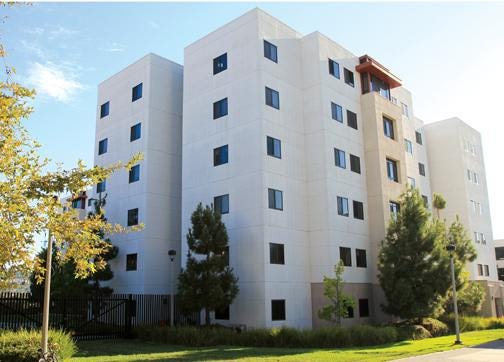San Diego State to test all on-campus residents, implement surveillance testing program
This story is for republication, originally written by the the Daily Aztec’s Brenden Tuccinardi and Katelynn Robinson. Use Brenden Tuccinardi and Katelynn Robinson | CSU Wire for the byline.

All students living on-campus at San Diego State are now required to be tested for COVID-19, the university announced in a campus-wide email Sept. 15, the same day the university reported 19 confirmed cases and nine probable cases of COVID-19. The total number of confirmed and probable cases associated with SDSU since Aug. 24 now stands at 676.
The process of testing the 2,400 students currently residing in university housing will begin Wednesday, Sept. 16, continue through Saturday, Sept. 19 and again on Monday, Sept. 21.
Through a partnership with San Diego County Health and Human Services Agency, SDSU Student Health Services is aiming
to test 500 students daily, according to the email.
At a press conference Tuesday, epidemiologist and Interim Director of SDSU’s School of Public Health Eyal Oren said the university’s new COVID-19 Surveillance Testing Program will provide a clearer picture of the situation on campus.
“This week of enhanced testing is going to provide us a broader baseline of (COVID-19) prevalence on campus and will generate a lot of information regarding where some of the hotspots where transmission is occurring and that is really going to guide our future efforts,” Oren said.
Students living in SDSU residence halls will be assigned a testing facility and time slot through their SDSU email account. Testing facilities will be hosted at SHS offices at Calpulli Center and a county HHSA testing location at the Parma Payne Goodall Alumni Center, located off 55th street.
After the initial testing of all on-campus residents, residential communities will be randomly tested periodically, according to the email.
“Periodic random testing of a representative sample of our students — specifically those who are asymptomatic — is a proven method and best practice which will provide critical information as we assess changes in the prevalence of COVID-19 within the SDSU community,” the email said.
Why test everybody now?
The decision to require testing for on-campus residents comes a day after the university’s “stay at home” order expired. Campus officials praised the order as a huge success and highlighted the effectiveness of off-campus patrols and a COVID-19 advisory in deterring large gatherings among SDSU students living in the College Area. To date, SDSU has processed 420 reports of public health and university policy guidelines and 62 reports are still being adjudicated.
Vice President of Student Affairs and Campus Diversity, J. Luke Wood, confirmed that SDSU has suspended students for violating university policy, though Wood did not go into specifics.
Wood said updated public health guidance informed the university’s decision to expand testing when it did.
“It’s easy to play Monday morning quarterback,” Wood said. “There have been a lot of intelligent people working arduously with a plan that was approved with the county and in consultation with the chancellor’s office with the CSU system. The guidance has changed and thus our response has changed.”
In the days leading up to the university announcing these new testing requirements, SDSU has borne the brunt of the blame as San Diego County teeters on the edge between tiers one and two of California’s reopening plan.
In a meeting Tuesday morning, Supervisor Diane Jacob asked county health officer, Dr. Wilma Wooten, where the county’s numbers would stand if the SDSU cases were not included.
“If we backed out the nearly 700 cases associated with the San Diego State outbreak (the county’s) case rate would be six, and we would remain in the red tier,” Wooten said.
Absent from Wooten’s comment is the fact that 75% of positive cases associated with SDSU are among students living off-campus, which is largely outside the university’s jurisdiction.
Where do we go from here?
Moving forward, the information provided by the required testing protocol will factor into whether the university will impose stricter measures on campus residents once more.
According to the email, a second stay at home order is “not anticipated” to go into effect if all students participate in the testing plan. There are limited exceptions that take into consideration students with disabilities and religious beliefs that would prohibit them from getting tested.
As an incentive, SDSU will give students who get tested a $5 Starbucks voucher (if they provide their RedID), and 10 randomly selected students will receive $100 gift cards to the Aztec Bookstore.
Additionally, the university has received approval from the CSU Chancellor’s Office to utilize the student judicial process as a means to enforce the testing requirement, Wood said.
The university encourages students currently living in off-campus residences to get tested and continue following COVID-19 safety guidelines.
SDSU’s continued approach to mitigating the spread of COVID-19 at SDSU and the surrounding community is comprehensive and wide-ranging, Wood emphasized throughout the press conference Tuesday.
“There is no such thing as a silver bullet here – it’s silver buckshot,” Wood said.
COVID-19 Testing and Resources:
SDSU offers free COVID-19 testing to all currently enrolled students, faculty and staff. Testing on-campus is available by appointment only. To schedule an appointment, students can call Student Health Services at 619-594-4325. Online appointments can also be scheduled through HealtheConnect, SDSU’s secure online health portal.
San Diego County also operates a free, drive-through and walk-up testing site at SDSU located at 6200 Alvarado Road in Parking Lot 17B. The county testing site is open to the public and does not require an appointment, more information is available at the San Diego County Health and Human Services Agency testing website.
Students visiting and living on campus are highly encouraged to practice social responsibility by wearing facial coverings, avoiding large gatherings and washing their hands frequently.



